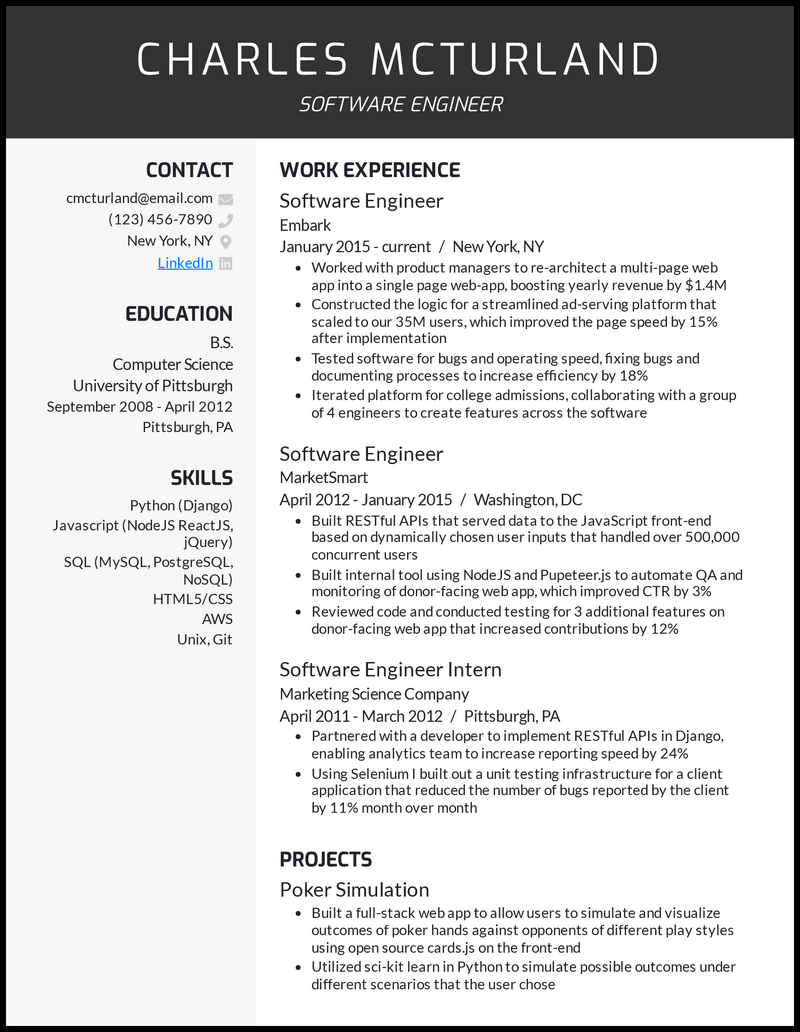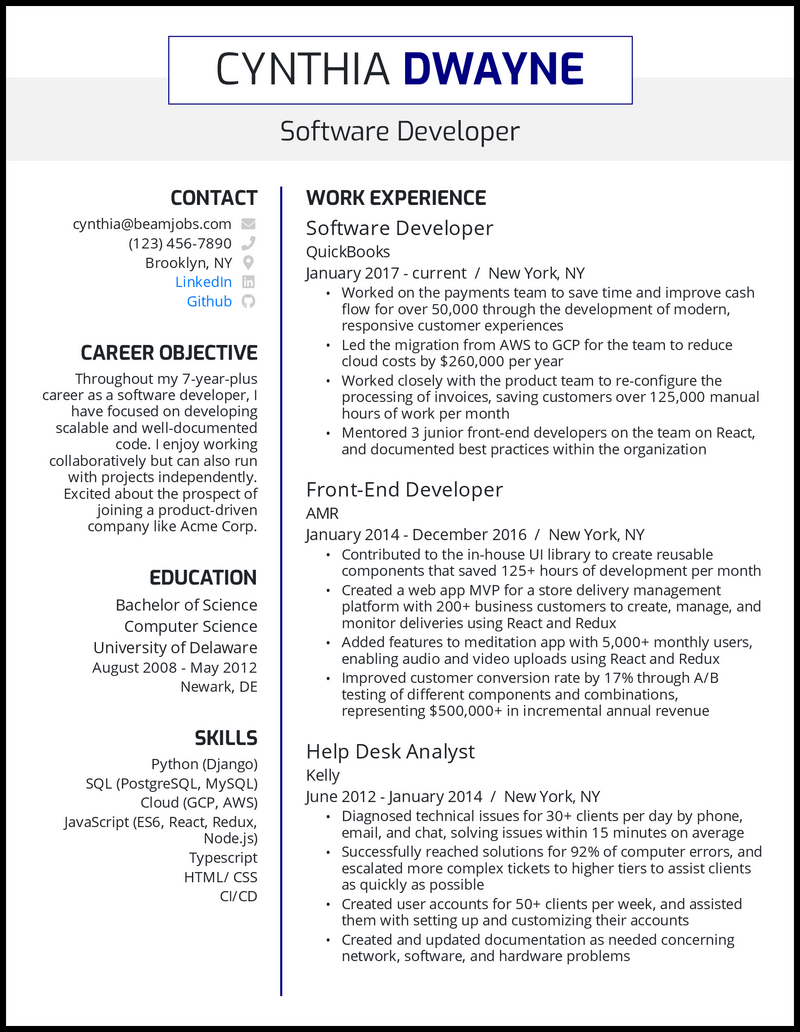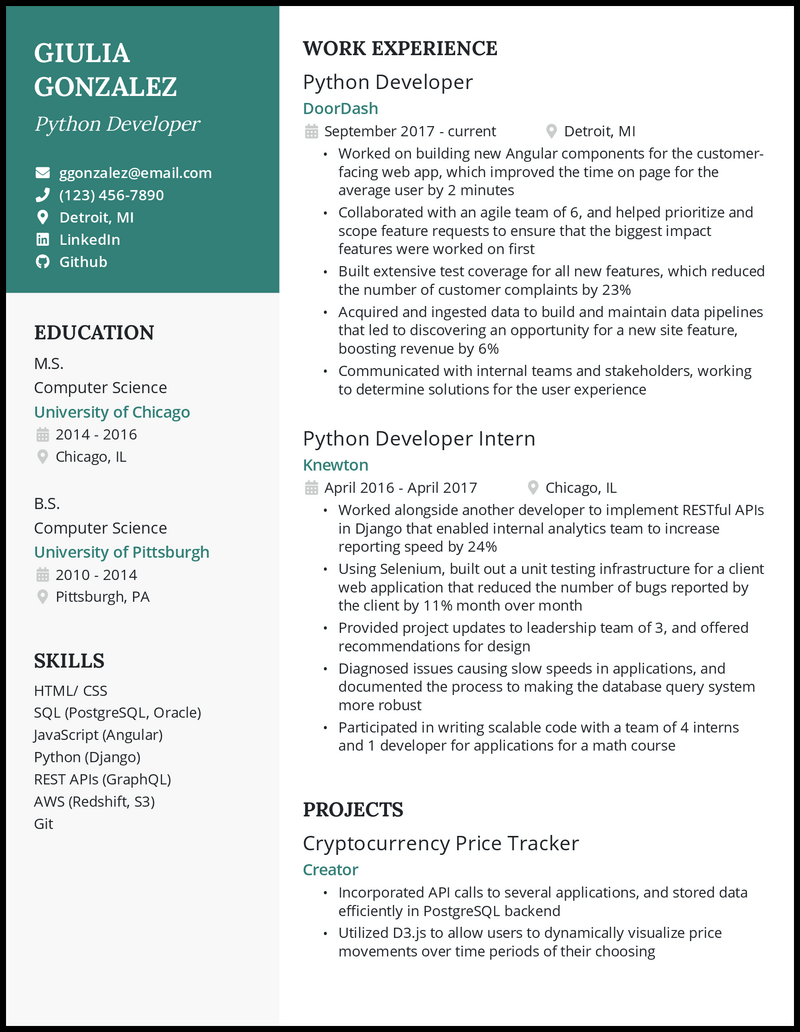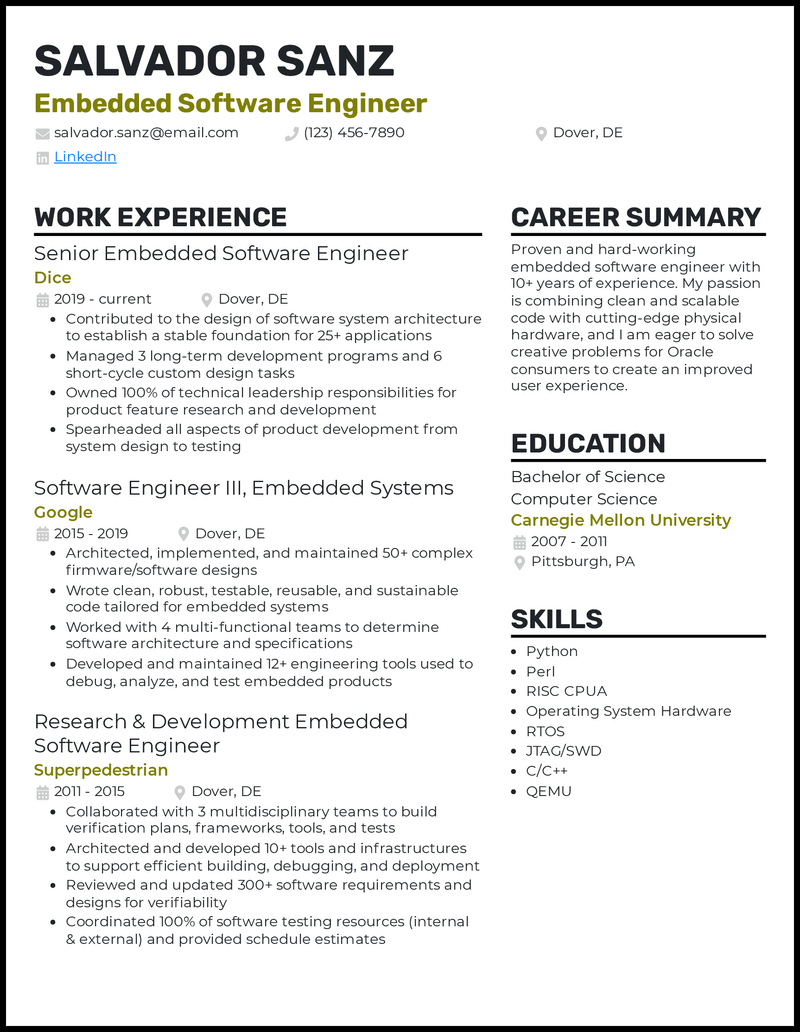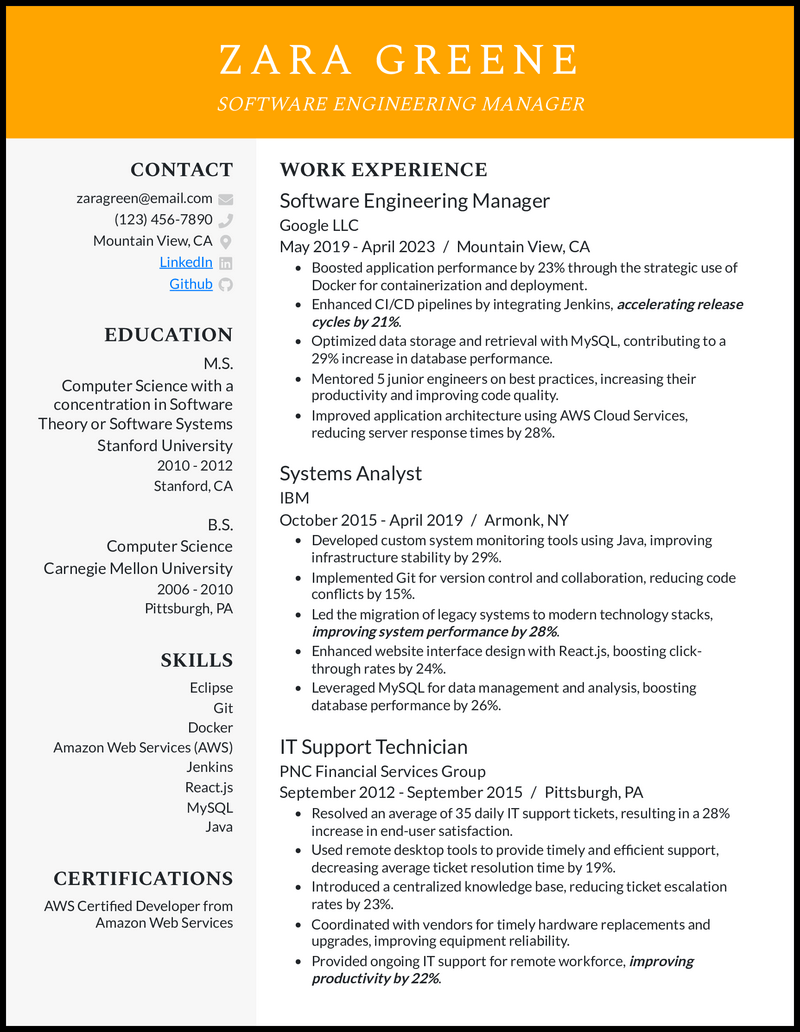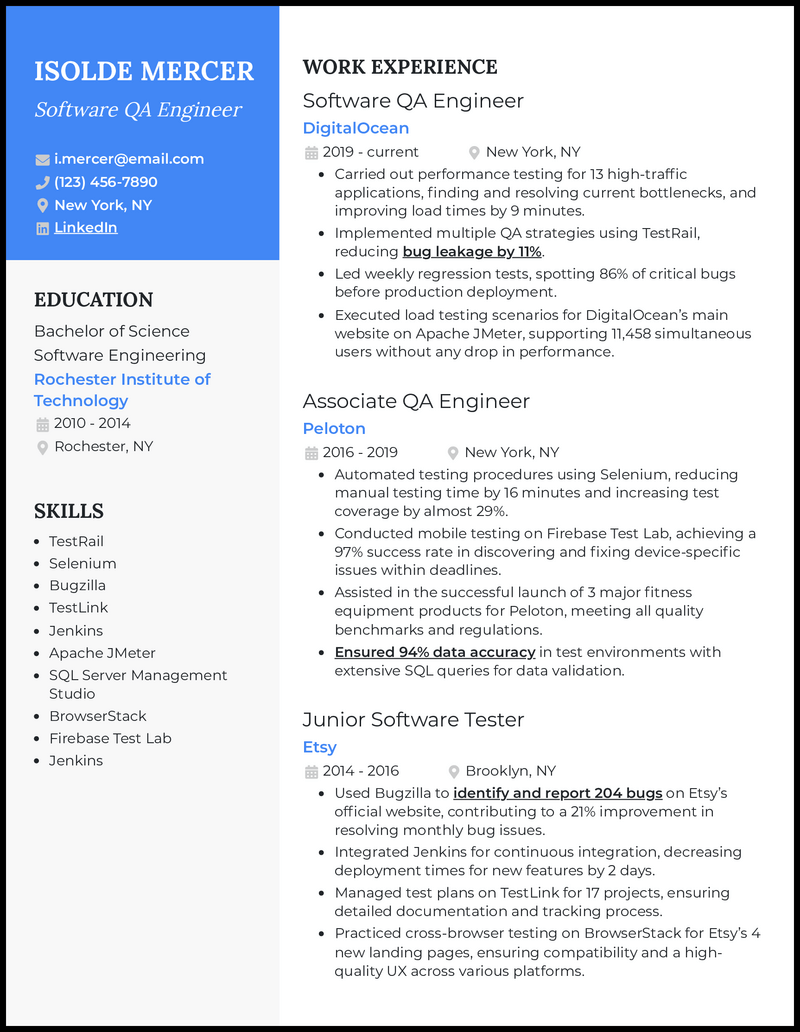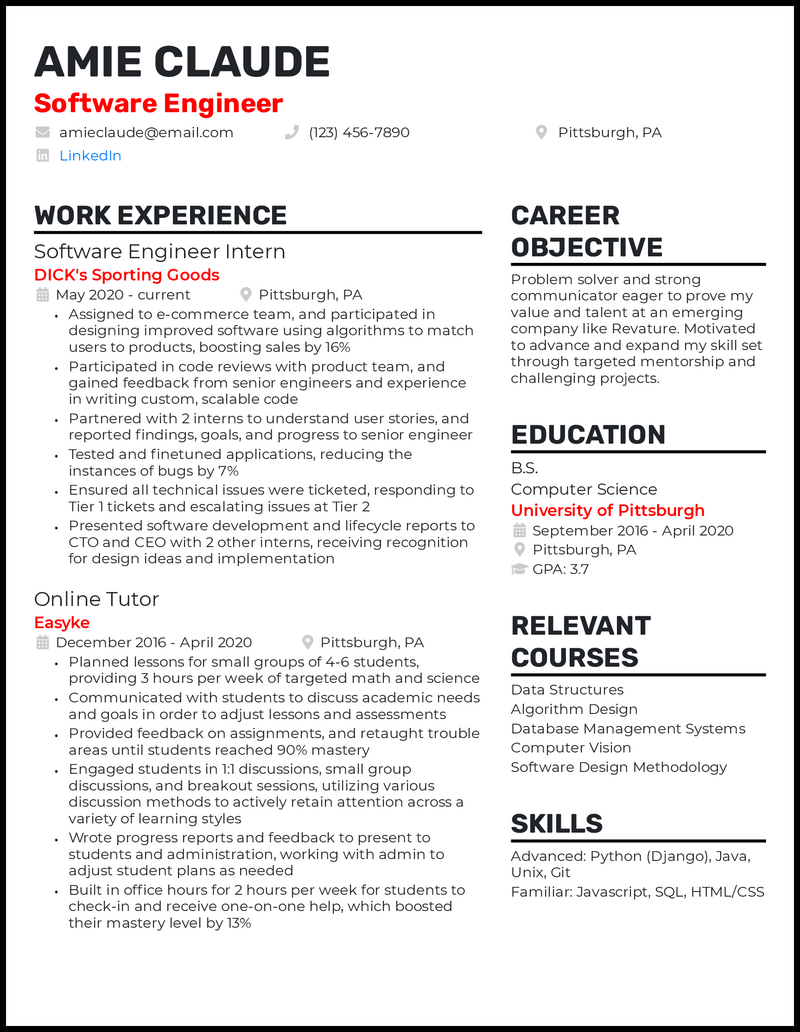To stand out, your software engineer resume needs to prove engineering impact, not just participation. Generate bullet points that use technically specific action verbs paired with metrics, tools, and outcomes laid out in clear, skimmable sections that make it easy for recruiters to find important information.
Choose a resume template that highlights what matters first: relevant skills, production experience, shipped projects, and keywords to surface in hiring systems or AI retrieval.
Here’s what we’ll cover:
- ↪ 34 real software engineer resume samples with analysis and takeaways
- ↪ What to include (and what to avoid)
- ↪ How to write high-impact bullet points that show results, not tasks
Why this resume works
- After choosing specific experience for your bullet points for your software engineer resume template, such as rearchitecting a multi-page web app, think about how you can show business impact: quantify your work, which may have resulted in increased revenue, user counts, efficiency, etc.
Why this resume works
- In the software life cycle of “create, maintain, improve, and delete,” a software developer is primarily a creator and maintainer. However, because of the amount of niche positions, be careful when adding a job title to your developer resume. Always adjust the title on your resume to match the title listed in the software engineer job description.
Why this resume works
- Highlighting a career with increased responsibility and leadership in your software engineering roles is key to getting noticed, especially when you back it up with numbers.
See more senior software engineer resumes >
Why this resume works
- Python developers aren’t very common outside the typical confines of the data analyst/scientist or machine learning world. That said, it’s all the more important that your Python developer resume continuously points toward having well-rounded experience by including a projects section.
See more of python developer resumes >
Why this resume works
- Rather than listing soft skills, seek to demonstrate communication and collaboration with teams in your work experience bullet points on your resume with context and impact.
See more embedded software engineer resumes >
Why this resume works
- Focus on mentioning your expertise in Java from the get-go. Use the most recent work experience in your Java software engineer resume to label how you’ve used the language to create/optimize existing systems and quantify your contribution.
Why this resume works
- Including technical courses like ‘Computer Organization and Architecture’ in your software engineer intern resume will show them you have a solid understanding of the fundamentals.
See more software engineer intern resumes >
Why this resume works
- Adding tools and cloud-based services under the Google Cloud umbrella to your Google software engineer resume shows the company you’re well-versed in multiple development solutions.
See more Google software engineer resumes >
Why this resume works
- Adding measurable results to your software engineering manager resume will help an employer evaluate the progress and results you’ve brought to companies you’ve previously worked with. This simple addition of observable statistics can go a long way in setting your resume apart from the crowd.
See more software engineering manager resumes >
Why this resume works
- Demonstrate how your programming skills have evolved or how your interpersonal abilities helped advance your team. And be sure to back your claims with data. Cut the fluff away from novice jobs to leave room for more impressive credentials you earned later in your career.
Why this resume works
- Your time as a developer in a personal endeavor may have involved several responsibilities and accomplishments that make for a worthy addition to your junior software engineer resume.
See more junior software engineer resumes >
Why this resume works
- Did your overhauling MYSQL schema indexation expedite data access? Mention time saved in hours per month or week. Can you recount how many technical guides you built or published or how many users benefited from your software programs? Specify the numbers. Dollar-amount savings should also suffice in your metrics.
Why this resume works
- Adding hobbies, for example in this resume, participating in coding challenges and hackathons can show you’re passionate about software engineering outside work hours—something any employer will love to see.
See more principal software engineer resumes >
Why this resume works
- One way to demonstrate experience level is to include a relevant certification on your experienced software engineer resume. Good examples include a Certified Software Development Associate (entry to mid-level) and Certified Software Development Professional (seniors).
Why this resume works
- It is paramount that your director of software engineering resume shows your numbers for managing teams, cutting costs, expediting processes, and properly managing and prioritizing resources to exceed targets and goals.
See more director of software engineering resumes >
Why this resume works
- Make the best first impression on your employer by highlighting your master’s degree in computer science. It gives more credibility and shows that you’ve professionally learned how to lead other engineers and also keep systems running smoothly.
Why this resume works
- Writing a backend software engineer resume is a lot like building good code—your masterpiece must be bug-free (read, error-free). Grammar slip-ups, silly typos, spelling, and punctuation mistakes can easily sink your chances of getting an interview. Fix your resume before you send it off into the world.
Why this resume works
- For a new grad software engineer resume, talk about using Jenkins for integration automation, building custom UIs with Django, optimizing databases with MySQL, and more that you uncover in the company’s job description.
Why this resume works
- List your best achievements so far like “Grew Amazon Prime subscriptions by 18%” to show your to-be employer you’ve got what it takes to leverage technology and use it to drive better customer experience metrics.
Why this resume works
- If the job description makes a big deal about jQuery, spend time talking about how you’ve used that rather than your experience with Cash.js.
See more associate software engineer resumes >
Why this resume works
- Share technical highlights on your front-end software engineer resume, like automating front-end testing with Jest or reducing site load time, to prove you won’t be hired for nothing.
Why this resume works
- Add as many education qualifications as you possess to maximize the impression that you’re a certified software developing maestro. These aren’t just fancy additions to your resume but proof of your problem-solving and critical skills, making you the go-to guy for any tech need.
Why this resume works
- Take a minute to revisit every programming language you’re proficient in. You’ve got a long list you can add to a resume outline, but only include skills mentioned in the company’s job description.
Why this resume works
- Use the skills section of your software engineer new grad resume to highlight the technical knowledge and expertise you can bring to the company you’re applying to. Review the job description to know the company’s requirements and adjust the skills you include.
See more software engineer new grad resumes >
Why this resume works
- Including skills like PostgreSQL, Apache Hadoop, and Git enrich your FAANG software engineer resume prove to employers that you’re basically the Swiss Army knife of technology, all ready to confront any software needs Silicon Valley throws your way.
Why this resume works
- A stellar education section should show off your relevant tertiary training, such as a Bachelor’s in Computer Science. Right below that, specify the university you attended, its location, and the years you spent there. And if you’re holding two degrees, remember that the master’s degree takes precedence.
Why this resume works
- Draw out important impacts you’ve created on the job such as reducing coding errors and expanding test coverage to be a standout candidate.
Why this resume works
- As long as you have relevant project experience, you’ll be good to go. Plus, you could leverage a strong career objective that clearly labels why you want to join the specific company and your main aim after being hired.
Why this resume works
- Show off any internships you’ve gotten. You can treat them like work history, listing them in the experience section of your tech resume template and quantifying impact when you can.
See more entry-level software engineer resumes >
Why this resume works
- The fact that the software engineering market is booming is a double-edged sword—there are plenty of lucrative opportunities like the one you’re eyeing right now, but the competition is insane. To come come out top pack your resume with technical skills like Python, React, and MySQL or a job-relevant educational background, such as a degree in software engineering.
Why this resume works
- Your mid-level software engineer resume should give prominence to accomplishment metrics that touch on your application tools competencies, process streamlining, project timeline reductions, and ability to utilize resources to meet outcome expectations.
Why this resume works
- In your resume skills section, include the programming languages—JavaScript, Python, Go—the company requests explicitly in the job description to strategically align your full-stack engineer resume and better fit the ATS screening criteria.
Why this resume works
- If the new role you’re applying for is seeking front-end work, focus on skills in CSS, React, and Angular, for instance, which are likely mentioned in the job description and you need them on your software engineer front end resume as well.
Why this resume works
- Software engineer resume templates should have a good “visual voice” that’s as unique as you, so don’t be afraid to play with colors, font types, and layouts. So long as it’s easy to read, format your resume to match your style.
See more software integration engineer resumes >
How to Format a Software Engineer Resume

You understand the importance of maintaining clean code and ensuring that what the user experiences on the front end is aesthetically pleasing and functional. This line of thought needs to translate to your resume format.
The following will keep your technical resume template solid:
- Reverse-chronological format: This means you’ll list your most recent experience first, which gives recruiters an understanding of your current expertise and skillset. It will also demonstrate your career growth as an engineer.
- Contact header: This is arguably the most important thing you can include on a resume. If you forget or misspell your name, email address, location, phone number, LinkedIn, GitHub, or portfolio URL—well, it won’t matter how much you’ve reduced page load or developed components that improved user engagement. If the hiring manager can’t contact you, it’s a no-go.
- Top SWE resume sections: At minimum, your resume will be incomplete without your work experience, skills, and education sections.
- Manageable chunks of text: It’s tough to fit all your projects and experience on a single page. Rather than try to list everything you’ve ever done, stick with what aligns best with the job description, quantifying your experience when you can to prove business outcomes. More on this in a bit.
- Keep verb tense consistent: Refer to old roles and projects in the past tense and refer to your current position in either the present or past tense.
- Length of resume: Recruiters spend, on average, six to seven seconds reviewing your resume. They’re not going to read a several-page resume. You can get away with a two-page resume if you have over 10 years of experience, but even then, why risk it?
- File type: When you’re applying for software developer jobs, don’t end up in the abyss because you sent a file that got distorted. PDF is your best bet unless the company specifically requests a different file type.

Bullet point formatting
Your goal with your resume for software developer jobs isn’t just to include your best talking points; it’s also to make the life of the person reviewing it as easy as possible. Nix long paragraphs of text so it’s easier to read. This is especially important if you have a non-technical recruiter reviewing your software engineer resume. Break up your would-be paragraphs into singular ideas that are more manageable for the reader.
Bad bullet point formatting
- Designed and built out the backend for a client application that enabled users to build their own recipe books. Used Angular on the front-end and NodeJS on the back-end. Working closely with product managers, scaled this application to 200,000 users and generated annual revenue of $1.4M. (If you’re still reading this, then well done, because it’s far too long.)
Good bullet point formatting
You can present the same information but in a much more digestible way in a couple of bullet points:
- Designed and built out the back-end for a client application with Angular and NodeJS that enabled users to build recipe books
- Collaborated with product managers to scale the application to 200,000 users and generate annual revenue of $1.4M
How to Write a Software Engineer Resume
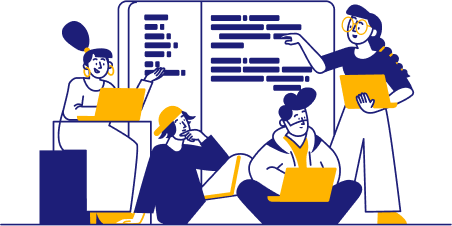
To secure a top-tier role in this competitive filed, your software engineer resume must pack a powerful technical punch, clearly show business impact, and be format-optimized for human scanning and AI retrieval. Therefore, your resume should mirror how engineers write code: clean, modular, and purposeful — leading with precision, clarity, and relevance.
Whether you’re browsing resume examples, trying to write a resume from scratch, or perfecting your resume format, remember: each section must answer this one key question—why you over everyone else?
Essential elements of a winning software engineer resume
- Clear summary statement
- Structured tech stack and skills section
- Quantified achievements
- Recruiter-centric and ATS-friendly resume format
- Keywords from the job ad
- Projects that show ownership
- Industry certifications and credentials
- Education, but de-prioritized

Why your resume must be ATS and recruiter optimized
When you apply for an engineering job, the first person looking at your resume is typically not a person. Companies use something called an Applicant Tracking System (ATS) to filter out candidates based on keywords.
If you pass this initial screening, it’s likely a recruiter will review your resume next—and there’s no guarantee this person will have a technical background.
So, how do you write a resume that jumps through all the hoops to snag the first interview? That’s what this guide is designed to help you do!

How to write work experience in a software engineer resume
Your work experience section is, without a doubt, the most important section in technical resume templates. It’s here that a recruiter will decide whether they want to move you onto the first stage of the interview process. So, this is not the place to be humble. Show off the good work you’ve done.
If you’re a junior developer, this section will be shorter (in favor of a longer projects section). If you have two-plus years of work experience, this should take up the majority of the space on your software developer resume.
So how do you talk about your work experience convincingly?
Use hard stats to make technical work tangible, and not just describing tasks.
Common quantifiers include:
- Performance gains
- Downtime reductions
- Revenue impact
- Code coverage
- Team velocity improvements
Bad work experience description
Check out this bad bullet point description that dismisses the individual’s contribution to the project.
- The team changed our primary product from a multi-page app to a single-page app, resulting in $1.2M in annual incremental revenue
Good work experience description
But note how this job seeker teased out their exact contributions to the project in this good example.
- Architected the new back-end in Ruby to change a multi-page primary product app into a single-page app, resulting in $1.2M in annual incremental revenue
Remember, when talking about your actual work, you want to be specific about your particular contributions. However, when talking about the project’s impact, you can talk about the overall effect that the team achieved.
How to quantify your impact in developer resumes
Businesses hire engineers to move the company forward, and the best way to demonstrate you can do that is to show you’ve had a measurable impact in your past roles. Rough estimates of impact are okay if you don’t have exact numbers; just be reasonable and logical in your assessments.
Here are some other ways you can try to quantify your work:
- Reduced downtime by X%
- Improved the speed of the application by X%
- Implemented a product feature that improved customer retention by X%
- Improved customer satisfaction (as measured by NPS) by X%
- Built a feature that improved click-through rate by X%
- Scaled a product that successfully handled X concurrent users
- Automated a process that saved X hours of manual labor each week
- Improved a product feature that increased usage by X%
- Worked on a project that led to a cost savings of $X
- Implemented unit tests that improved test coverage by X%
- Fixed a bug that reduced customer complaints by X%
Follow this formula to generate bullet points that tell potential employers you’re the piece of the puzzle missing in thier tech team:
Action verbs + task accopmlished + specific tools/skills + metrics (where applicable) = measurable achievements
Examples:
- Optimized Redis caching to reduce API latency by 71%, improving response times for 10k+ daily requests
- Led migration to Kubernetes, cutting deployment errors by 88% and accelerating release cycles by 4 days
- Implemented LaunchDarkly feature flag system adopted by 4 engineering teams, reducing rollback time by 2 hours per incident

What skills should be in a software engineer resume?
Your software engineer resume should highlight both technical and collaborative skills. A good strategy here is to narrow your skills down to your line of specialization and not mentioning generic proficiencies that every other engineer will list.
The skills section is a vital part of your software engineer resume. This will make or break whether you get through the first phase of the resume review, aka the dreaded ATS scan.
The worst thing that can happen is that you claim knowledge of a programming language and then can’t answer basic questions about that language in an interview. It’s far better to have expertise in one programming language than to claim knowledge of 10.
Good companies realize that quality engineers can learn new frameworks as needed. So, it’s a big red flag if you list every programming language under the sun. Remember, a list of 30 skills and tools doesn’t equate with a good software engineer resume.
For example, for a backend developer resume, prioritize:
- Languages like Python, Java, or Node.js
- Frameworks like Django
- Databases (SQL/NoSQL)
- Infrastructure tools like Docker, Kubernetes, and AWS
- Soft skills like system design, debugging, and cross-team communication
The skills section is a vital part of your software engineer resume. This will make or break whether you get through the first phase of the resume review, aka the dreaded ATS scan.

How should I structure my resume skills section?
Your resume’s skills section shouldn’t be a laundry list of frameworks and programming languages. Don’t try to include what you wouldn’t be comfortable coding; just reading about Java is not enough to have it in your skills section.
It’s far better to have expertise in one programming language than to claim knowledge of 10.
Here are a few options for organizing the skills section on your resume:
Skills organized by proficiency
- Advanced: Python (Django), Java, Unix, Git
- Familiar: JavaScript, HTML/CSS, SQL

Or you can organize them by the type of skill you’re discussing. So you can separate the programming languages you know, the frameworks, the tools, and the databases you’ve used.
Skills organized by type
- Languages: Python, JavaScript, HTML/CSS, Java
- Frameworks: Django, NodeJS, ReactJS
- Tools: jQuery, Unix, Git, Selenium
- Databases: SQL (Postgre SQL, MySQL), NoSQL, AWS

Finally, you can list the programming languages you know and include the frameworks associated with that language you’ve used. You can also list your years of experience with that language. This is useful for recruiters, but it can take up a lot of space on your resume, so make sure your resume format allows for an extended skills section.
Skills organized by years of experience
- Python (Django) 8 years
- JavaScript (NodeJS, ReactJS, jQuery) 8 years
- SQL (Postgre SQL, MySQL, NoSQL) 8 years
- HTML 5/CSS 8 years
- AWS 5 years
- Unix, Git 8 years


How do you write an education section on a software engineer resume?
If you have a college degree, include it, of course, but you may find that SWE jobs are favoring skills over degrees.
If you’re applying for anything other than an entry-level role, that’s all you should include in your education section. Why? Because real estate is valuable on a resume, and your work experience and projects will convey more about your qualifications than your college courses or GPA.
Suppose you’re applying for a software engineering internship or looking for your first full-time role. In that case, your education section should be more expansive to accurately convey your qualifications.
You may want to mention relevant courses to the role for which you’re applying. For software engineering roles, this means any classes related to software engineering (duh). Took a databases class? Completed an algorithm design course? You get the idea.
If you want to include your GPA, make sure it’s above a 3.5. Otherwise, leave it out.
Entry-Level software engineer education
Example
University of Pittsburgh – B.S. Computer Science
2016-2020
Pittsburgh, PA
Cumulative GPA: 3.7
Relevant courses: Data Structure, Algorithm Design, Database Management Systems

VS
Senior software engineer education
Example
University of Pittsburgh – B.S. Computer Science
2011-2015
Pittsburgh, PA


Do certifications matter on a software developer resume?
Certifications are useful for entry-level roles or when you want to signal specialty skills. They’re especially valuable in cloud (e.g., AWS Certified Developer) or security domains. However, for experienced developers, the real-world impact of a project carries more weight. Therefore, if you must include certifications, place them near the bottom, unless the job explicitly prioritizes them.

Other software engineering resume sections
Projects, an objective/summary, and/or hobbies and interests may be appropriate to include on your software development resume, depending on your experience level and the company.
Projects
The size of your projects section on your software engineer resume should be directly tied to your seniority level when applying for a developer job. The more junior your role, the more space you should allocate to your projects.
If you have more than two years of experience, you should only list one project you’re especially proud of. Most of your resume should be composed of what you did in your previous jobs.
Try to talk about your projects in the same way you’d talk about your work experience. The goal of your projects is to demonstrate your technical skills in context. Show how you used a language or framework to build something that satiated your curiosity or solved a problem.
Your projects should give more color to your skills section. While it’s great to say you’re proficient in Ruby, it’s even better to say how you built the back end of your movie recommendation engine in Ruby. Anyone can list a skill on their resume, but showing how you used that skill demonstrates mastery.
If you worked on substantial coding projects during school, you should include them here. When possible, always include the projects you’ve listed on your resume in your GitHub profile or on your personal website.
Here’s the format of how you should talk about your projects on your software developer resume template:
- Describe the problem you were trying to solve and how you solved it at a high level. In the example above, “Built an Android app to allow party-goers to vote on what song should play next.”
- Next, discuss some technical details in either one or two bullet points.
Again, you’re trying to demonstrate two things to a hiring manager with your projects. First, you want to give context to the skills you list on your resume. Next, you want to show that you can identify a problem and then implement a solution to solve that problem.
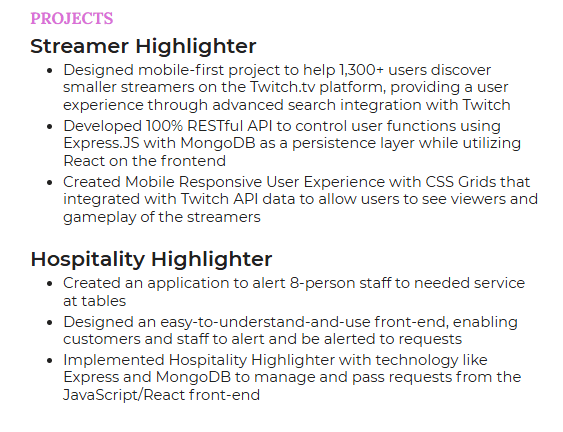
Career objectives or resume summaries
Unless it’s done exceptionally well, we strongly recommend that you don’t include a resume summary or objective in your software engineer resume. Why? Because they rarely convey meaningful information. While there are some differences between a summary and objective, they have a lot of similarities, so we’ll break down the typical objective statement for you here, starting with a poor example:
I have 3+ years of experience, and I’m looking to leverage my Django expertise to work on challenging problems as a senior software engineer.
There isn’t anything new in this objective that can’t be easily found in the resume. Their 3+ years of experience and Django expertise should be demonstrated in their work experience. There’s no customization for the specific job, and it’s far too short.
Remember, recruiters typically glance at your resume for mere seconds. Don’t make them waste precious time on anything that doesn’t demonstrate new information about why you’re a great fit for the role.
It is possible to write a career objective that does provide something fresh to the reader, but it takes a keen eye and understanding the pain points that the company is trying to address through the open role. If you’re up for the challenge and the extra time it’ll take to make a customized objective, go for it. It might look something like this.
New computer engineering graduate with strong problem-solving skills and a commitment to excellence, seeking a software engineer role at Salesforce. Excited to use my skills in Git and Python to support Salesforce’s vision of helping companies connect with their customers in fresh ways.
This example specifically addresses the company by name, and the candidate discusses how their particular skills can meet a need for the company.
Anything unique to your situation or circumstance (for example, you’re undergoing a career change) should be discussed when creating a cover letter. You can elaborate on what you’re looking for in your next role without the constraint of space.
Interests & hobbies
Most of the time, this section is unnecessary and takes up precious real estate. However, if you’re an entry-level software engineer or in an associate/junior position, it might be a good idea to include one to two specific hobbies or interests in your resume.
This is where you need to practice some discernment, though, and “read” the company. Some companies appreciate personality and emphasize cultural fit, so this would be the time and place to highlight a couple of hobbies or interests that might complement your resume and demonstrate that you’re well-rounded.
Personal hobbies like game development, hackathons, or contributing technical articles to a blog are a few good ideas that can provide a more complete story of who you are in the professional world of engineering.

How to customize your software engineer resume to the job
The number one way you can increase your odds of landing interviews is by customizing your software engineer resume to each job you apply for.
We get it—taking the time to tailor your resume for each application sounds tedious and frustrating, but the good news is that you don’t need to overhaul your resume. You just need to make adjustments that align with the software developer job description.
As you look through the company’s job listing, think about the projects you’ve worked on and the tech stack you’ve relied on in past work that match up with the job ad. You’re looking for crossover—and that’s what you really want to zero in on to make the best software engineer resume.
Now, let’s say the job ad mentions the following:

Clearly, they want an engineer experienced in developing APIs. You’ll want to make sure you discuss the work you’ve done associated with APIs (and it’s impact) in your work experience and skills section.
For example, one bullet point might look something like this in your experience section:
Designed and implemented a RESTful API for integrating third-party payment gateways, which reduced transaction processing time by 22% and subsequently reduced user drop-off at checkout by 42%.
Be specific about the skills you include in your skills list, too: Django, Postman, and AWS CloudWatch are just a handful that might be relevant. Again, think about your past experience in tandem with what the job ad wants.

Beyond your software engineering resume
While your resume is your single most important document in your job search for the right software developer role, think beyond it. Recruiters and hiring managers expect to see a resume, so considering how you can get your foot in the door through other avenues has the potential to pay off in spades.
- Send a letter of interest
- An interest letter expresses your, well, interest for a software engineering role—even if a position isn’t currently open. Discuss your tech stack and some of your proudest achievements that align with the company’s goals, such as automating infrastructure management tasks that saved 10 manual hours a week. You can bet the company will keep your letter on file, and when they need to hire, you’ll be top of mind.
- Actively network
- We could write a whole post on this, but that’s not the purpose of this guide. There are a zillion things you can do to signal that you’re serious about job hunting and landing the right fit. Try optimizing your LinkedIn and setting your profile to say open to work, collaborating on GitHub repositories, building your portfolio, participating in hackathons, or connecting with prior professors or colleagues who could serve as referrals.
- Complete your job application with a software engineer cover letter
- Even if it’s not required, making a cover letter has the potential to tell a more meaningful story of your career accomplishments because it allows room for a few more details than your resume. Start with an engaging hook that shows your alignment with the role, share details of work achievements that attest to soft skills like collaboration and hard skills, such as implementing a software with C#, and express your interest for further discussion to close.
Even if you’re not planning to leave your current job for another year, think ahead by leveraging the above to go beyond the reach of your resume. Now is the time to start working on getting your dream software developer job. Remember, to get your foot in the door, you have to start moving in the direction of that door now!

Key takeaways
- Format your software engineer resume so that it’s one page, in reverse order, includes your contact information, work experience, skills, and education at a minimum, and leverages manageable chunks of text as opposed to paragraphs.
- In your work experience, avoid regurgitating job duties and discuss tangible accomplishments like changing a multi-page app into a single-page app.
- Demonstrate business impact in your bullet points with metrics, such as revenue generated, time saved, and user engagement increased.
- Be choosy with your skills list, opting for 10 or less that attest to your ability to work within the tech stack laid out in the job description.
- Keep your education and certifications section brief and relevant to the role you you’re applying for, and consider including projects, an objective/summary, or interests/hobbies only if those elements would enhance your application.
- Customize your software engineering resume template to the job by discussing skills and experience that align with the pain points and requirements mentioned in the job description. Check out various resume examples for inspiration.
- Strive to be a well-rounded job seeker by taking steps to connect with software engineering experts and colleagues and by reaching out directly to companies you’d be interested in working for one day.
Software Engineer Resume FAQs

Hiring managers prioritize relevance to the job description above anything else.
Ensure your resume demonstrates:
Technical skills aligned with the role (languages, frameworks, tools)
Projects that show business impact
Problem-solving and collaboration
A public GitHub or portfolio
Tailor your software engineer resume to reflect the wishes of recruiters and AI bots by doing the following:
Customize each resume to the job’s niche (e.g., automation vs. web dev)
Align skills and experience sections with the job description
Emphasize impact over responsibilities
Create a structured skills section with no more than 10-12 relevant items. Follow these tips
Group skills by category: Programming Languages, Frameworks, Tools, Databases
Reflect terms used in the job description
Only list skills you’re proficient in
If you’re early in your career or a fresh grad, highlight projects like experience in this format:
Name of personal or academic projects
Description of what you built, and how
Showcase your tech stack and problem-solving in context
Measurable results
A senior software engineer resume should focus on leadership, architecture, and delivery. Here’s how to do it effectively, like the pro you are:
Use a reverse-chronological format to showcase career progression and more responsibilities
Skip the projects section and instead link to a GitHub or portfolio
Highlight experiences that highlight mentoring, cross-functional collaboration, and product impact
A resume summary is the much-needed retrieval-optimized intro block that sets the tone for the rest of your application.
Use it to:
Summarize your expertise, years of experience, and niche focus
Highlight top skills
Mention at least one core achievement
Match the language and expectations of the job
According to the US Bureau of Labor Statistics, the annual median salary for software engineers and developers is $130,160. The median hourly pay is $62.58. Not too shabby!
With the job outlook expected to grow 17 percent between now and 2033, this is a comforting fact to spur you forward in your job search.
If you’re not already in one of these states, are you open to making a cross-country move? These states represent the top median pay for software engineers and developers:
↪ California: $173,780 annually or $83.55 per hour
↪ Washington: $159,990 annually or $76.92 per hour
↪ Maryland: $150,740 annually or $72.47 per hour
↪ New York: $150,020 annually or $72.12 per hour
↪ Massachusetts: $146,580 annually or $70.47 per hour




